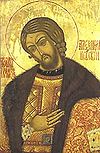- Abram Deborin
-
Abram Moiseyevich Deborin (Joffe) (Russian: Абра́м Моисе́евич Дебо́рин Ио́ффе; June 16 [O.S. June 4] 1881 – March 8, 1963) was a Soviet Marxist philosopher and academician of the Soviet Academy of Sciences (1929).
Entering the revolutionary movement by the end of the 1890s, Deborin joined the Bolshevik faction of the Russian Social-Democratic Labour Party in 1903. By 1907, however, he switched to the Menshevik faction and became known as one of Georgi Plekhanov's disciples, both in politics and philosophy. In 1908, Deborin graduated from the philosophy department at Bern University (L.I.Akselrod had received her doctorate there in 1900). He soon began publishing major books and articles on philosophy from a Marxist perspective.
Soon after the October Revolution of 1917, Deborin left the Mensheviks and began lecturing at the Sverdlov University, the Institute of Red Professors and the Institute of Philosophy. He soon assumed editorial duties at the journal, "Under the Banner of Marxism," which he headed from 1926-1931.
Following the 1917 October Revolution, Soviet philosophy found itself divided itself between two factions: the "dialecticians," headed up by Deborin, and "mechanists," whose leading figure was the philosopher Lyubov Akselrod (the then prominent Bolshevik leader Bukharin was seen as an ally of the "mechanists," although he did not entirely agree with them). In 1931, Joseph Stalin decided the issue of the debate between dialecticians and mechanists by publishing a decree which identified dialectical materialism as pertaining solely to Marxism-Leninism. He then codified it in Dialectical and Historical Materialism (1938) by enumerating the "laws of dialectics", which are the grounds of particular disciplines and in particular of the science of history, and which guarantees their conformity to the "proletarian conception of the world". Thus, diamat was imposed on most Communist parties affiliated to the Third International. Diamat became the official philosophy of the Soviet Union and remained as such until its dissolution. When Stalin decided in favor of dialectical materialism, Deborin made a show of support for Stalin's position. For some years afterwards, Deborin kept a low profile, and most of his writings were suppressed. However, he lived long enough to see all of his works republished in the Soviet Union during the "thaw" under Nikita Khrushchev.
External links
- Deborin's Biography (in Russian)
- Deborin's photo – from the Russian Academy of Sciences
- Frederick Choate's website on Deborin
People from Russia Leaders and religious - Pre-1168
- 1168–1917
- 1922–1991
- 1991–present
- RSFSR leaders
- General secretaries
- Soviet premiers (1st deputies)
- Soviet heads of state (and their spouses)
- Prime ministers (1st deputies)
- Foreign ministers
- Prosecutors general
- Metropolitans and patriarchs
- Saints

Military and explorers - Field marshals
- Soviet marshals
- Admirals
- Aviators
- Cosmonauts
Scientists and inventors - Aerospace engineers
- Astronomers and astrophysicists
- Biologists
- Chemists
- Earth scientists
- Electrical engineers
- IT developers
- Linguists and philologists
- Mathematicians
- Naval engineers
- Physicians and psychologists
- Physicists
- Weaponry makers
Artists and writers Sportspeople - Chess players
Categories:- 1881 births
- 1963 deaths
- Jewish atheists
- Materialists
- Members of the Russian Academy of Sciences
- Russian atheists
- Russian Jews
- Russian Marxists
- Russian philosophers
- Soviet philosophers
- Russian academic biography stubs
- Philosopher stubs
Wikimedia Foundation. 2010.
